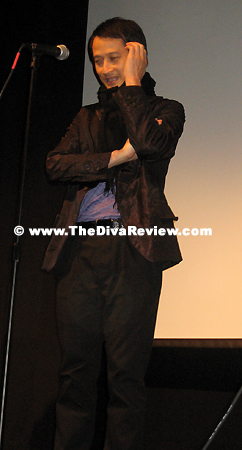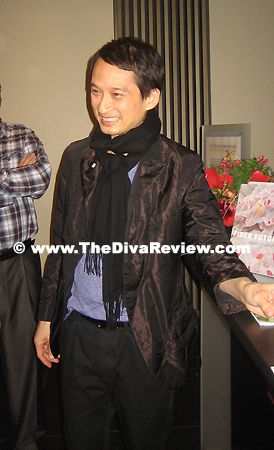|
“It’s
okay, I like toxic women”
~Tran Anh Hung, New York City, 2011
 With
that breezily candid declaration by director Tran Anh Hung, helmer of
such gripping dramas as the Oscar-nominated The Scent of Green Papaya
and Cyclo, we have our reason and motivation behind his latest film, an
adaptation of author Haruki Murakami’s signature novel, Norwegian Wood. With
that breezily candid declaration by director Tran Anh Hung, helmer of
such gripping dramas as the Oscar-nominated The Scent of Green Papaya
and Cyclo, we have our reason and motivation behind his latest film, an
adaptation of author Haruki Murakami’s signature novel, Norwegian Wood.
Toru
Watanabe is having the existentialist blues. The world is changing from
the simple place he knew; going to school, hanging around with his best
friend, Kizuki and Kizuki’s girlfriend, Naoko, as a happy third wheel,
to observing the civil disobedience and political protests that mark
college campuses all across late-1960’s Tokyo. The other occurrence
that disturbs the balance of Watanabe’s uncomplicated life is the
suicide of Kizuki. His death will bear repercussions for Watanabe and
harsher ones for Naoko, who summarily loses touch with Watanabe, but
meets again by chance some time later. Their shared closeness to Kizuki
and their grief and bewilderment over his suicide draws the pair
together. Naoko’s guilt because of her feelings and eventual intimacy
towards Watanabe builds to the point where she leaves him to go to a
sanatorium deep in the Kyoto woods. In the long stretch of time before
he can see Naoko in the asylum, Watanabe’s life goes on; working in a
record shop and being a University student. It’s on campus where he
meets the vivacious Midori, who makes no bones about her attraction to
Watanabe, catching him up in a flirtatious game of hurry up and wait,
alternately alluding to a boyfriend then making Watanabe doubt that she
has one. Despite Midori’s flitty charms, the lure of Naoko calls him
like a siren to the sea; his every visit to Kyoto reviving his hope that
she’ll recover and come home to him. It seems for every step forward,
Naoko is always pulled back by her inability to process the effect of
Kizuki’s death or her own sexual inhibitions and violent mood swings,
which may all be part of the same issue. Watanabe’s feelings for Naoko
pull on him stronger than his budding affection for Midori and he is
caught between the two women, with a third, Naoko’s close friend and
co-patient at the asylum, Reiko, thrown in for good measure.
The
siren analogy I made a few lines earlier is fairly apt; Watanabe is like
a man lost at sea, buffeted between the forces of nature and each
calling shore represents a new danger: With Naoko it’s the fear that
she might never get well, or conversely what it means if getting well
requires abandoning her guilt-ridden relationship with Watanabe.
Midori’s seemingly normal flirtations are filled with emotional booby
traps that Watanabe, caught up in his love for Naoko, is too dazed to
navigate, and quite frankly, Midori’s a bit of a flake. After all his
expectations and disappointments with Naoko, has he the strength to deal
with another complicated woman? Even Watanabe’s fleeting moment with
the older Reiko is fraught with emotions over their love of Naoko and
Reiko’s own story of sadness.
Director Tran captures the dizzying coming of age of young Watanabe as
he faces more difficulties in his first love than the average teenager,
yet his refusal to give up on the ideal of Naoko, no matter how much of
it may only exist in his mind, is universal. How much of his feelings
for the girl is based on the real Naoko, who, at her most present is
only barely there? She exists as a will-o’-the-wisp in their
relationship; part of her seeming to have left this earthly plane when Kizuki did. The start of their attraction may have partly originated
with Watanabe seeing himself standing in to care for Naoko in Kizuki’s
stead. Naoko’s neediness, fragility and unattainability capture the
young man irrevocably. The risk for Watanabe is being caught in the
vertigo that Naoko represents. Tran photographs the beautiful natural
imagery around the Kyoto mountainside asylum in all its bursting colours
and blinding snows in a perverse counterpoint to the washed-out grays of
“normal” life on campus in Tokyo, which is the perfect analogy for
Watanabe’s life without Naoko. Even tomcatting around with a pal who
refuses to be faithful to his wonderful girlfriend does nothing to
anesthetise Naoko’s absence or fade her memory. Norwegian Wood captures
the fever of Watanabe’s first stirrings of love, heightened by the
danger and unpredictability of Naoko’s illness, his loss of self and the
long road of self-discovery he must follow.
Tran
weaves a gorgeous, hypnotic web of emotion and austerity. He captures
the rushes of passion that suddenly grow cold and full of regret. We
feel a youth’s obsession with his image of the girl he loves, rather
than her reality, and his refusal to let go of that dream even when a
saner, safer option stands waiting. Tran conducts amazing performances
from his actors, particularly Kenichi Matsuyama, who we have lauded on
this site since his appearance in 2005's wonderful Linda Linda Linda, and
later as L in the Death Note films. The role of Watanabe is a turning
point in the young actor’s career because we see him transform from teen
idol to a serious artist of depth and maturity. It’s remarkable to
watch him grow up during the process of this film, taking dares that
might never have come to him had he been careful to protect his strong
fan following. Tran doesn’t shy away from the sexuality of the story (excepting
in those subplots left out of the adaptation) and while the nudity
isn’t abundant or remotely gratuitous, it is there, and it is a
significant moment for Matsuyama to be portrayed in a realistic adult
role. Despite all the grown-up trappings, his Watanabe never loses the
boyish sweetness that keeps him carrying the torch for Naoko, being
befuddled by Midori or expressing tenderness for Reiko. It’s his
almost-childlike acceptance of the things out of his control that
anchors Watanabe as he exists inside this tornado of complicated
femininity. Oscar nominee Rinko Kikuchi is perfectly cast as Naoko; she
is half myth and half flesh in Watanabe’s mind. She beguiles him
without trying to and desperately wants to love him – or someone – but
simply can’t. Kikuchi makes the variations in Naoko’s behaviour utterly
believable and heartbreaking. The viewer wants her to recover; they
want her to not suffer and to find a happy life with Watanabe. Kiko
Mizuhara captures the coltish playfulness and flirtatiousness of Midori;
but just as she’s full of warmth and spark and life, the actress can
turn it all off in heartbeat, growing wan and distant, making the
temperature in the room drop below freezing after being wronged by
Watanabe. In a small role, but worth a mention for the power of the
scene, Eriko Hatsune plays Hatsumi, the girlfriend of Watanabe’s playboy
pal, Nagasawa. In a moment that’s downright masochistic, while the trio
is at dinner, Hatsumi insists on Watanabe telling her all about the
night he and her wandering man spent out playing together; sharply
cutting off any placating interruptions or prevarication from her
conniving beau. The mounting tension in the scene as she explains to
Watanabe her confusion about how a man who claimed to be in love with a
woman could hurt his lover by wanting somebody else is riveting.
Hatsune plays the scene with Hatsumi desperately holding on to her last
thread of poise and grace, while the underlying pain at having to say
these words is palpable and show-stopping. It’s one of those moments
that hurts to watch. The quality of the acting is even more remarkable
when one considers that the director doesn’t speak the same language as
his Japanese cast. Tran blends all these performances beautifully with
a sharp, unsentimental script, amazing cinematography and an evocative
score to make Norwegian Wood a haunting, mesmerising symphony of
heartache, love, loss and hope.
Gorgeous, this.
~ The
Lady Miz Diva
January 1st, 2012
Exclusive Interview with Tran Anh
Hung and Rinko Kikuchi
 The Lady Miz Diva:
Norwegian Wood is a career-making role for Kenichi Matsuyama. I wonder,
Ms. Kikuchi how you prepared for your scenes together, and for Director
Tran, what was it you saw in him that convinced you he was Watanabe? The Lady Miz Diva:
Norwegian Wood is a career-making role for Kenichi Matsuyama. I wonder,
Ms. Kikuchi how you prepared for your scenes together, and for Director
Tran, what was it you saw in him that convinced you he was Watanabe?
Rinko Kikuchi: I never saw his films before I worked with him, but
we talked a lot about character. The sex scene? It was like
choreography. I’m so lucky to work with him because he really
challenged me a lot and also I challenged him, so that was great.
Tran Anh Hung: What was really important for me is to find someone
who has the same feeling of humanity of the character, and when you find
someone like this, then you know that you can work with him and find a
way to make a good shot with him. So, it was not really difficult. We
talked a lot, like Rinko said, and they talked a lot, and most of the
time I got into their conversation and changed everything.
RK:
So mean! {Laughs}
 TAH:
{Laughs} And sometimes we improvised a lot because just before
the shooting of the scene, sometimes I would change everything. I don’t
want to shoot the scene anymore because somehow, it doesn’t work anymore
after a few weeks of shooting. Then I would ask for a half an hour to
write another scene to replace it and then discuss again and shoot the
scene. TAH:
{Laughs} And sometimes we improvised a lot because just before
the shooting of the scene, sometimes I would change everything. I don’t
want to shoot the scene anymore because somehow, it doesn’t work anymore
after a few weeks of shooting. Then I would ask for a half an hour to
write another scene to replace it and then discuss again and shoot the
scene.
LMD:
Director Tran, had you seen Mr. Matsuyama’s work before you cast him?
TAH:
No, I just asked to see everyone.
 LMD:
How did you get Jonny Greenwood from Radiohead to score the film? LMD:
How did you get Jonny Greenwood from Radiohead to score the film?
TAH:
He was in Tokyo for a concert, so I met with him and asked him if he
would like to do the score for this project and he said yes. So
something like three months later, we got an email from his manager and
he said he’s not available anymore because Thom Yorke would like to go
back and record something. So he told me that he was sorry, but he
needed to go back. I shot the movie and after shooting the movie, I said
“No, I need him. It must be him.” Then I tried to put the music that he
did for There Will Be Blood in the movie and it worked so well that I
sent him an email saying, “Jonny, I need you because your music is
perfect for the movie.” And he sent me an email saying “Are you crazy?
What does this Irish music have to do with your Japanese story?” I
said, “Okay, I’ll send you some scenes with your music and you will
see.” I sent him this and he called me back and he said, “If you accept
not to go with a big orchestra and if we go with a sextet, then I will
have time for you.” I said, “Okay, no problem for the sextet.” And then
we started to work on it and then finally he said, “Oh no, we need an
orchestra.” {Laughs}
~The
Lady Miz Diva
December 14th, 2011
Special thanks and
appreciation to Mr. Samuel Jamier, of the Japan Society for his generous
assistance in arranging these interviews.


© 2006-2022 The Diva Review.com |
